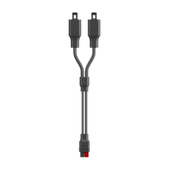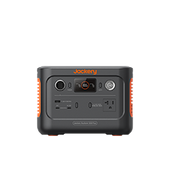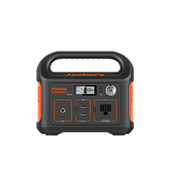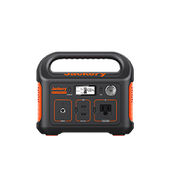The average electric bill in Philadelphia is $229.56. This rate is calculated based on an electricity rate of 20.70 ¢/kWh as of July 2024 and a monthly consumption of 1,109 kWh. Compared to July 2023, when residents were charged at a rate of 20.20 ¢/kWh, there is a noticeable increase in 2024. This hike significantly impacts Philadelphia's overall cost of living, which currently stands at $1200 per month for a single person, not including the housing rent.
According to the US Bureau of Labor Statistics, Philadelphia's average electricity bill is projected to continue rising in the coming months, potentially surpassing current rates by 2025 and beyond.
For those seeking to reduce their monthly electricity expenses and adopt environmentally friendly solutions, Jackery Solar Generators can offer an excellent alternative. These solar generators can power up to 99% of household appliances, including air conditioners, refrigerators, laptops, sump pumps, etc.
Key Takeaways
In this comprehensive guide to understanding the average electric bill in Philadelphia, we will cover a range of important topics, including:
- A detailed comparison between the average electric bills in Philadelphia from January 2024 to May 2024 and the US data.
- A comparison of different electricity providers in Philadelphia based on their current rates.
- An in-depth analysis of utility costs to help understand the cost of living in Philadelphia.
- The significance of solar energy and how it can significantly reduce monthly bills.
- A detailed understanding of how Jackery Solar Generators are ideal for both households and outdoor living.
What Is The Average Electric Bill in Philadelphia?
As of July 2024, the average electric bill in Philadelphia is $229.56 per month. This figure is derived from the latest data provided by the US Bureau of Labor Statistics, which shows that residents consume an average of 1,109 kWh each month at a rate of 20.70 ¢/kWh.
Philadelphia is one such city in Pennsylvania that has seen a steady increase in electricity rates in the last couple of years. If you check the historical data, you will find that in 2022, the average electricity rate in Philadelphia was 18.03 ¢/kWh, which rose to 19.6 ¢/kWh in 2023. The current electricity rate marks a 6.7% increase from the previous year.
This significant hike in the electricity rates and monthly bills highlights the growing expense of energy in this region, which directly influences the household budget and overall cost of living.
When the Philadelphia average electricity bill is compared to the national data, you will find that the city's average electric bill is noticeably higher. Based on an average consumption of 1,000 kWh and an average electric rate of 16.68 ¢/kWh, the national average electricity bill stands at $166.80.
|
Month/Year |
US Average |
Philadelphia |
|
January 2024 |
17.3 ¢/kWh |
20.0 ¢/kWh |
|
February 2024 |
17.3 ¢/kWh |
20.1 ¢/kWh |
|
March 2024 |
17.4 ¢/kWh |
20.6 ¢/kWh |
|
April 2024 |
17.3 ¢/kWh |
20.5 ¢/kWh |
|
May 2024 |
17.5 ¢/kWh |
20.6 ¢/kWh |
|
June 2024 |
17.8 ¢/kWh |
21.3 ¢/kWh |
|
July 2024 |
17.8 ¢/kWh |
20.7 ¢/kWh |
As you can see in the above table, the difference between Philadelphia's electric rates with the national average is pretty apparent. In January 2024, the national average rate was 17.3 ¢/kWh, while Philadelphia's rate was 20.0 ¢/kWh. This gap persisted throughout the first half of the year, and the ongoing summer and coming winter are predicted to bring similar changes.
Philadelphia's Electricity Source
Like most cities in the United States, Philadelphia's electricity is sourced from diverse energy types. For instance, natural gas is the primary source of the city's power, contributing 61% of energy. The second-largest contributor is nuclear energy, accounting for 32%. The city is not inclined towards coal due to environmental concerns, but it contributes 3% to its energy mix.
That said, renewable sources like wind, hydroelectric, and solar also play an important role. In Philadelphia, wind and hydroelectric each provide 2% and 1%, respectively. Solar energy contributes another 1%.
What Are The Electric Rates in Philadelphia?
The electric rate, often referred to as the electricity tariff by a few providers, is the total amount charged by an electricity provider to its customers for the consumption of electric power. Electric rates can be constant or change according to government norms and other factors, including but not limited to the cost of generating electricity and transmission and distribution expenses.
The electric rate directly influences the monthly electric bill of households and businesses. For example, with an average consumption of 1,109 kWh per month and an electric rate of 20.7 ¢/kWh, Philadelphia residents face an average electric bill of $229.56. Any change in the electric rate will directly affect the average electric bill.
Electric Rates from Different Providers
Philadelphia offers a range of electric rates for residential and commercial customers. The rates change based on ongoing market conditions and regulatory policies.
For Residential Customers
Tomorrow Energy has a 12-month plan at a 7.18 ¢/kWh rate, but it has an early termination fee of $75. New Wave Energy also provides a 12-month plan at 9.10 ¢/kWh. If you prefer Clearview's services in your area, you can check their 12-month plan at 8.30 ¢/kWh. On the higher end, you have Energy Harbor, which also has a 12-month plan but at 9.49 ¢/kWh, while APG&E’s 12-month plan stands at 9.42 ¢/kWh and its 24-months plan will come at 9.75 ¢/kWh.
Check out the June 2024 electricity plans from the notable providers in Philadelphia:
|
Electricity Provider |
Plan Name |
Contract Term |
Electricity Rate |
|
Tomorrow Energy |
Earth Care |
12 months |
7.18 ¢/kWh |
|
New Wave Energy |
New Wave Energy |
1 months |
9.10 ¢/kWh |
|
New Wave Energy |
New Wave Energy |
12 months |
9.20 ¢/kWh |
|
Clearview Energy |
ClearGuard |
12 months |
8.30 ¢/kWh |
|
Energy Harbor |
Safe Harbor 12 |
12 months |
9.49 ¢/kWh |
|
APG&E |
TrueSimple 24 |
24 months |
9.75 ¢/kWh |
For Commercial Customers
If you own a business, you can adhere to the commercial electricity rates provided by different service providers. New Wave Energy offers several competitive options, starting at 8.64 ¢/kWh and going up to 8.80 ¢/kWh, depending on the contract term. It also offers a 36-month term at 9.70 ¢/kWh. This electricity rate may be tempting for those businesses that seek long-term stability in their energy costs.
Here's a detailed table outlining different commercial plans from different providers:
|
Electricity Provider |
Contract Term |
Electricity Rate |
|
New Wave Energy |
3 months |
9.00 ¢/kWh |
|
New Wave Energy |
6 months |
8.88 ¢/kWh |
|
New Wave Energy |
12 months |
8.50 ¢/kWh (new customers) |
|
New Wave Energy |
24 months |
8.64 ¢/kWh |
|
NextEra Energy |
12 months |
8.80 ¢/kWh |
|
New Wave Energy |
36 months |
9.70 ¢/kWh |
With these many options, it may become confusing for a few how to choose the best electricity providers in Philadelphia. When making a decision, there are a few tips that might guide you to make the best possible choice:
- Compare Rate:Always start by looking at the electricity rates offered by different providers. For instance, Earth Care offers competitive rates of 7.20 ¢/kWh for a 12-month plan, while New Wave Energy offers 7.60 ¢/kWh for the same term. You can choose Earth Care or New Wave Energy based on their online reviews or contract terms.
- Contract Length:Always consider the length of the contract before making a long-term decision. Short-term contracts might offer lower rates, but longer contracts can provide rate stability. So, choose the electricity provider that matches your requirements.
- Hidden Fees:Before signing a contract, look for additional fees or charges that might not be included in the advertised rates. Contact the provider's customer support team and inquire if there are any cancellation charges as well.
How Much Does It Cost to Live in Philadelphia?
The average cost of living for one person in Philadelphia is roughly $1200, without considering the house rent. The total cost of living comprises some common utility charges that are borne by the residents, like electricity, water & sewer charges, gas charges, and more. The cost of living will vary depending on your monthly consumption, location, and service provider.
Here's a breakdown of the common utilities in Philadelphia:
Electricity Charges
As stated above, the average electric bill in Philadelphia is $229.56 per month. This cost is based on an average consumption of 1,109 kWh per month at a rate of 20.7 ¢/kWh. If your consumption is less than 1000 kWh, then your electricity expense would be lower.
Gas Charges
Natural gas is another major utility expense in Philadelphia. The average monthly cost ranges from $80 to $96, based on the usage of 64 thousand cubic feet (MCF) per year. Customers are charged supply and delivery charges, which include the cost of the gas itself and the cost associated with delivering the gas to the residents or offices.
Water & Sewer Charges
In Philadelphia, the monthly water bill for a typical residential customer is $74.81, which also includes the sewer usage charges of $17.18. The senior citizens in Philadelphia can avail the water at a discounted rate of $45.12, including $12.37 for sewer charges. These charges include the costs of water supply, wastewater treatment, and infrastructure maintenance.
Internet Charges
There are several internet service providers in Philadelphia, and each offers a different rate plan based on download speed and data. The average cost of the Internet in Philadelphia is around $86 per month. However, several utility providers offer budget-friendly options, such as a 300Mbps cable internet plan for just $25.00 monthly.
Cable TV Charges
For entertainment purposes, residents here can avail of cable TV services from $60 to $75 per month, depending on the package. These packages typically offer between 290 and 450 channels, which provides a wide variety of viewing options that suit different preferences.
Here's a table illustrating the utility cost breakdown in Philadelphia:
|
Utility |
Average Cost (per month) |
|
Electricity |
$229.56 |
|
Gas Charges |
$80 - $96 |
|
Water & Sewer Charges |
$74.81 |
|
Internet Charges |
$25 |
|
Cable TV Charges |
$60 - $75 |
Tips to Reduce Utility Rates
If you are also someone who is tired of paying a hefty amount against the utilities every month, then check out a few tips that might help you control the expenditures without compromising on your comfort or lifestyle:
- Try investing in solar generators like Jackery Solar Generators to reduce reliance on the grid.
- Upgrade to energy-efficient appliances to reduce electricity and gas consumption.
- Properly seal and insulate your home, apartment, or even commercial building to maintain a temperature that reduces heating and cooling costs.
- You can even plan to replace all the old incandescent bulbs at your place with modern LED lighting to decrease electricity usage.
- If it fits into your daily schedule and budget, periodically plan for maintenance of all the HVAC systems and other high-power-consuming appliances to keep them running efficiently.
Why Is My Electric Bill So High in Philadelphia?
If you've noticed that your electric bill is higher than expected, you are not alone. According to the Philadelphia Inquirer, Philadelphia residents may see a rise of 12% per month in their utility bills. So, now would be the right time to start understanding the important factors that contribute to the high electricity costs in Philadelphia.
Some of the most common factors are:
Urban Locations
Urban areas like Philadelphia often have higher electricity rates due to the higher cost of maintaining infrastructure and delivering power in densely populated regions. At the same time, there are several older infrastructures in Philadelphia that may require frequent repairs. All of these costs directly influence the utility bills that residents pay.
Climatic Changes
In 2023, several customers in Philadelphia faced heating bills of more than $400 a month during the extreme winters. Philadelphia is one such city that experiences both hot summers and cold winters, which leads to an increased use of air conditioning and heating systems. The overuse of these appliances directly influences daily consumption, resulting in higher electricity and gas charges.
Change in Electricity Rates
Philadelphia's electricity rates have been steadily increasing over the past few years. In 2022, the average rate was 18.03 ¢/kWh, which rose to 19.6 ¢/kWh in 2023. By May 2024, the rate had climbed to 20.6 ¢/kWh, a 6.7% increase from the previous year. This ongoing trend is driven by several factors, including fuel costs, investment in infrastructure, and more.
Energy Consumption
Your monthly energy consumption directly affects your utility bill. If you live alone in a one-bedroom apartment and use fewer appliances or limited natural gas and water, your cost of living will dramatically decrease. However, if you live with your family and use different appliances, like a refrigerator, washing machine, vacuum cleaner, lights, and more, your utility cost will be on the higher end.
How to Lower My Electricity Bill in Philadelphia?
With the rise in utility rates and market demands, it is highly recommended to start considering ways that would lower your electricity bill in Philadelphia. Lowering your monthly electric bill would involve adopting energy-efficient practices and making smart choices when it comes to exploring alternative energy solutions. Some of the common strategies that would help you reduce your electricity expenses are:
Use Energy-Efficient Appliances
Try upgrading to energy-efficient appliances that save you money and require minimum maintenance from service providers. The Environmental Protection Agency in the United States highly recommends going forward with Energy Star label appliances that consume less energy and reduce your overall electricity consumption.
Install LED Lighting
If you have a limited budget, it is recommended that you always start by replacing traditional incandescent bulbs with LED bulbs. Modern LED bulbs use up to 75% less energy and last up to 25 times longer than incandescent bulbs. You can install LED bulbs in areas where you spend most of your time, like the bedroom, kitchen, and a few outdoor spaces.
Limit Phantom Loads
Several household and outdoor appliances consume electricity even when they are not operational but are plugged into a power outlet. Some of the common appliances that increase the phantom load are soundbars, coffee makers, and gaming consoles. To eliminate these phantom loads, you can use smart power strips or even unplug these devices when not in use.
Switch to Solar Energy
Philadelphia City has an incentive program promoting solar photovoltaic system installation. The rebate offers $0.20 per watt for residential projects and $0.10 per watt for commercial projects. So, if you want to reduce your electricity bill while taking advantage of the incentive program, try embracing solar power.
Other than getting benefits of the rebate programs, there are several benefits of choosing solar energy, like:
- Solar energy can significantly reduce your electricity bills by providing a renewable source of energy that offsets the need for grid power.
- It is a clean and sustainable energy source that reduces greenhouse gas emissions and even contributes to a healthier environment.
- When you use solar power to generate your own energy, you reduce your reliance on the traditional power grid.
- It is often seen that homes equipped with solar panels have higher property values and attract more potential buyers.
The average solar panel installation cost is around $25,000. However, given a yearly consumption of around 14,000 kWh, a household will require 11.0 kW of solar panels to meet 100% of its annual electricity needs. On different marketplaces, an 11 kW solar panel system costs $28,000 and goes up to $33,000 before incentives.
When you install an 11 kW solar system at your home and assume a 3.5% annual increase in electricity prices, you can save approximately $2,600 in the first year. In the next five years, your savings can accumulate to $14,100. In the next ten years, you could save $30,800 and will save $74,300 in the first 20-year period.

If you do not wish to spend $33,000 on the solar panel installation, you can check out Jackery Solar Generators. These generators come with high-capacity batteries that let you charge mid-range appliances, like air conditioners, refrigerators, televisions, etc., and can also help with heavy-duty appliances, like electric grills, induction cooktops, central air conditioners, room heaters, and more.
By using a Jackery Solar Generator, you can substantially reduce your average electric bill in Philadelphia and can also carry them during outdoor adventures.
Jackery Solar Generators for Lowering Your Electric Bills
Jackery is a renowned manufacturer of highly efficient solar generators, solar panels, and portable power stations. The Jackery Solar Generators combine efficient Jackery Portable Power Stations and foldable Jackery SolarSaga Solar Panels.
The solar panels capture the sun's energy, which is converted to DC electricity and passed to the Jackery Portable Power Station. The pure sine wave inverter in the portable power station converts the DC to AC electricity, charging a variety of home or outdoor appliances for hours.
Solar generators are ideal for charging small—to heavy-duty appliances, such as air conditioners, portable refrigerators, sump pumps, well pumps, and other electronics. This helps you lower your electricity bills and reduce your carbon footprint. Here are three versatile Jackery Solar Generators ideal for home backup, van life, cabins, sheds, and home offices.
Jackery Solar Generator 3000 Pro
If you want to invest in a reliable charging solution that can power most appliances indoors or outdoors, the Jackery Solar Generator 3000 Pro seems like a great option. Whether you want to keep the refrigerator powered throughout extended power outages or practice off-grid living by being independent of the utility grid, the Jackery Solar Generator 3000 Pro can help you. Its high-capacity battery and massive power output ensure you can power 99% of appliances and reduce high electricity bills.
Appliance Running Time
- TV (150W) = 17.1H
- Refrigerator (800W) = 3.2H
- Coffee Maker (1000W) = 2.5H
- Electric Grill (1150W) = 2.2H
- Portable Fan (40W) = 64.2H

Customer Review
"Here in Michigan, we are just coming out of the sub-zero temperatures; during this, something happened the next street over, and the power went out. The Jackery powered a heater till the power came back on. Thanks." — Alicia Foster.
Jackery Solar Generator 2000 Plus
The Jackery Solar Generator 2000 Plus is a versatile and expandable charging solution featuring a stable LiFePO4 battery. It has an ergonomic design, foldable handle, and double wheels to move anywhere and charge 99% of indoor or outdoor appliances. The power station's 20-ms emergency power supply feature ensures your essential appliances, like refrigerators or air conditioners, stay powered during an unexpected power outage or blackout.
Appliance Running Time
- TV (150W) = 11.5H
- Refrigerator (800W) = 2.1H
- Coffee Maker (1000W) = 1.7H
- Electric Grill (1150W) = 1.5H
- Portable Fan (40W) = 43.4H

Customer Review
"We use the Jackery Explorer 2000 Plus with 2 Solar Saga 200w panels to power our XTool F1 portable laser air purifier laptop and lights on our canopy, and if the power goes out, I can power my CPAP machine with no need to pay the vendor for electricity." — Kevin J. Craig.
Jackery Solar Generator 2000 Plus Kit (6kWh)
The Jackery Solar Generator 2000 Plus Kit (6kWh) has a LiFePO4 battery that can charge heavy-duty devices up to 6000W, reducing electricity bills significantly. With the help of the Jackery Manual Transfer Switch, you can connect the portable power station to the home circuit and ensure your refrigerator or other essential appliances run even during power outages. If you want more power or wish to go completely off-grid, the battery capacity can be expanded from 2kWh to 24kWh.
Appliance Running Time
- TV (150W) = 34.7H
- Refrigerator (800W) = 6.5H
- Coffee Maker (1000W) = 5.2H
- Electric Grill (1150W) = 4.5H
- Portable Fan (40W) = 130.2H

Customer Review
"The Jackery Explorer 2000 Plus and Battery Pack with the 400W solar panels package is a great combination for home backup and RV usage. The 120VAC and RV receptacles and the others are great to have on the unit. The wheels on the generator are great as 64 lbs is easier to pull/push instead of carrying it." — Larry Gee.
Philadelphia Average Electric Bill FAQs
What size of solar generator do I need for my house in Philadelphia?
The size of the solar generator for your typical house in Philadelphia depends on the number of appliances that you plan to use. You may require a small generator or a large generator, depending on the number of appliances that you use at the same time. That said, the important aspect is understanding the working hours you will get with any particular solar generator.
For instance, if you are using Jackery Solar Generator 3000 Pro and aim to power an air conditioner (1400 W), sump pump (800 W), and a standard light bulb (60 W) simultaneously, then the working hours that you will get can be calculated by the following formula:
Working Hours = Battery Capacity in Wh * 0.85 / Wattage Consumption of the Appliances
Working Hours = 3024 Wh * 0.85/2260 W = 1.13 H.
Note: The battery capacity is multiplied by 0.85 to account for the power loss during the initial appliance charging.
What is the average electric bill in PA?
With an average electricity rate of 17.68 ¢/kWh and an average consumption of 854 kWh, the average electric bill in Pennsylvania is approximately $150.98 per month.
How much is the average WiFi bill in Philadelphia?
Philadelphia's average Internet or WiFi bill is around $86 per month, though prices can vary based on the plan and provider. A few Internet providers offer a budget-friendly option at $25.00 per month.
What is the average monthly utility bill in Philadelphia?
The average monthly utility bill in Philadelphia, including electricity, gas, water, and internet, typically ranges from $320 to $360. The price varies depending on the location, provider, and monthly usage.
How much is a water bill in Philadelphia?
The average monthly water bill for a typical residential customer in Philadelphia is $74.81. The monthly cost also includes $17.18 charges for sewer usage. Philadelphia City has reduced water bill options for senior citizens, who need to pay the average monthly water bill of $45.12.
Conclusion
Pennsylvania is one of the most populated states, and given the market trends and rising costs, the average electric bill in Philadelphia is going to rise in the years to come. The residents here may see a 12% rise in their overall utilities, which will directly affect their cost of living. If you want economical and environmentally friendly ways to reduce electricity bills, check out Jackery Solar Generators. These portable solar generators can charge high-wattage appliances at home and can easily be carried during the RV or camping -- making them an ideal choice for campers.













































































































![What Is The Average Electric Bill in Philadelphia [2024 Updated]](http://www.jackery.com/cdn/shop/articles/average_electric_bill_in_philadelphia.jpg?v=1718768084)







Leave a comment